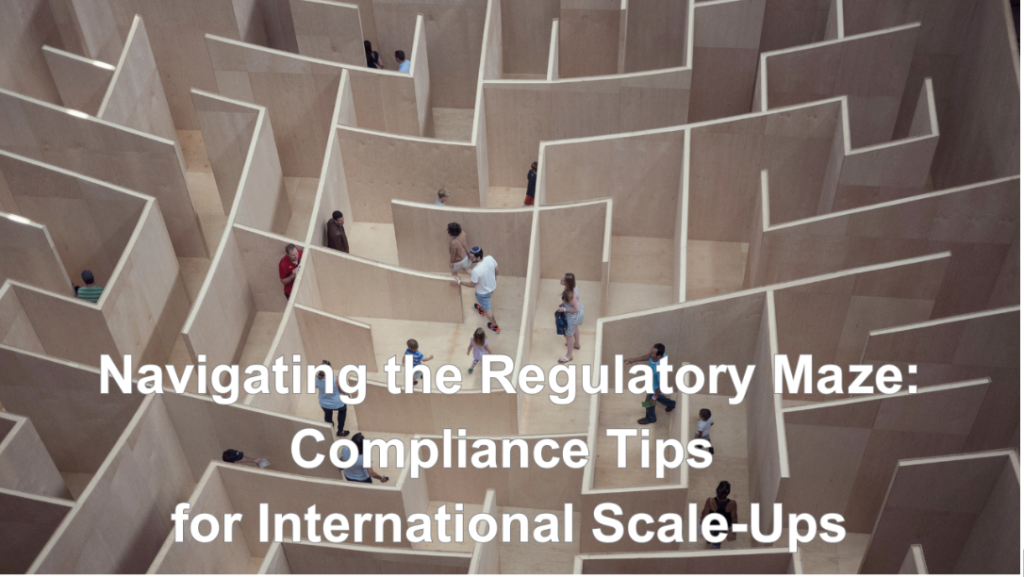Navigating the Regulatory Maze: Compliance Tips for International Scale-Ups
Scaling a business internationally presents owners with an exciting growth opportunity, but navigating the complex landscape of legal and regulatory compliance requirements across different markets can be daunting.
For scale-ups looking to expand, understanding the intricacies of compliance is crucial to avoid costly penalties, delays, and reputational damage. This blog outlines key compliance tips, with additional advice on our home market here in the UK, forming part of our broader blog series for international expansion.
Understand the Regulatory Environment
Before entering a new market, it’s vital to grasp the regulatory landscape, which can vary significantly from country to country. Bridgehead always conducts a thorough review of key areas such as employment law, consumer protection, data privacy, and import/export regulations. This initial research can help you identify potential obstacles and shape your market entry strategy.
In the UK, compliance with data protection laws like the GDPR, as well as sector-specific regulations, such as those for financial services (FCA requirements), is crucial. These might apply directly to your goods and services, or to your day-to-day business operations.
Another important thing to remember is the significance of your employees, and ensuring that health and safety standards set by the Health and Safety Executive (HSE) are strictly adhered to.
Let’s look at some of these challenges in more detail.
Prioritise Data Protection and Privacy Compliance
Data privacy regulations present one of the most challenging compliance areas for start-ups and scale-ups. It can seem overwhelming at first, but here in the UK the data protection regime is currently aligned with the EU GDPR, but this could change due to Brexit-related regulatory shifts. Keeping abreast of updates from the Information Commissioner’s Office (ICO) ensures ongoing compliance.
It’s essential to implement robust data protection policies and stay up-to-date with evolving requirements in each market where you operate. This not only safeguards your business against fines but also builds customer trust.
Develop a Strategy for Tax Compliance
Another topic which presents a lot of challenges for businesses when considering international expansion is the sticky topic of tax. Although the news might be filled with headlines about multinationals and tax evasion, we’d recommend avoiding this course of action. Tax regulations are among the most complex compliance challenges when scaling internationally, including corporate tax rates, VAT, customs duties, and transfer pricing rules. A proactive approach to understanding the tax implications in each market will help avoid unexpected liabilities.
The UK’s corporate tax landscape has certainly become more intricate following changes to VAT regulations post-Brexit. Scale-ups should familiarise themselves with Making Tax Digital requirements and the nuances of VAT registration if looking to use the UK as a springboard to selling to EU customers.
Stay Informed About Regulatory Changes and Evolving Standards
As Brexit has demonstrated, the regulatory landscape is not static. As governments and regulatory bodies adapt to new challenges, especially in areas like technology, financial services, and environmental impact, staying informed about changes is crucial. Subscribing to regulatory updates and industry news, or joining relevant trade associations, can keep you ahead of upcoming changes.
Here in the UK, we recommend keeping a close eye on updates from bodies such as the FCA and ICO. Find the time to read any whitepapers released by the UKGov, as these are essential for clarifying regulatory developments for businesses operating in the UK.
Utilise Technology to Manage Compliance Across Multiple Markets
Compliance management software can help scale-ups automate regulatory tracking, streamline document management, and simplify reporting requirements. These tools are particularly useful for managing compliance across multiple jurisdictions, where manual processes may become unmanageable.
In the UK, integrating software solutions that align with Making Tax Digital or help with GDPR compliance can ensure efficient management of your regulatory obligations.
Leverage Legal and Compliance Expertise Early On
As you expand into new markets, engaging with legal experts who understand the local regulatory environment can save time and prevent costly mistakes. Local advisors or international law firms with expertise in cross-border compliance can provide invaluable guidance tailored to specific jurisdictions.
Partnering with UK-based experts, like Bridgehead, can help ensure compliance with local regulations, including the requirements for company formation, intellectual property protection, and financial reporting.
Conclusion
Navigating the regulatory maze is a key challenge for scale-ups expanding internationally, but a proactive approach to understanding compliance requirements can unlock opportunities for growth while mitigating risks. By focusing on the unique regulatory needs of each market, especially the UK, and leveraging expertise and technology, businesses can scale successfully while staying compliant.
If you need any help and support in growing your business, contact us!






